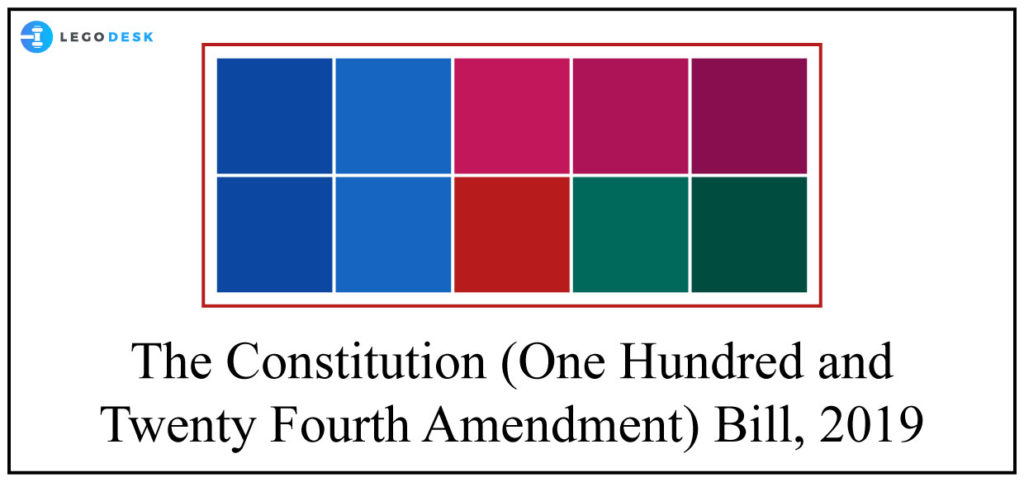The Constitution – One Hundred and Twenty Fourth Amendment Bill, 2019

The Constitution- One Hundred and Twenty-Fourth Amendment Bill, 2019 was introduced in the Lok Sabha by the Minister of Social Justice and Empowerment, Mr. Thaawarchand Gehlot. It seeks to provide reservations for the advancement of ‘economically weaker sections of society. It is a landmark in the history of reservation policy in India, not because it adds another category to the multitude of categories already present in the reservation system, but because it completely overhauls the original logic of reservations.
Read Also – Article 16 of the Constitution of India
What Is The Logic Behind The Bill?
Reservation for the most oppressed groups was brought along as a policy of compensatory discrimination, as a remedial measure for the historical oppression and deep discrimination that these groups had faced. This finds the soul in Article 15 and Article 16 of the Indian Constitution. The Bill seeks to amend these two articles to permit the government to provide reservations for the advancement of EWS. 10% of these seats may be reserved for admission in educational institutions but not minority educational institutions. This 10% reservation also extends to government employment for all posts under the Government of India.
By bringing forth this amendment, a few things become very clear. First, this indicates a fundamental change in the policy of affirmative action. This is because no quotas are being provided on an economic basis, with a specific rider that says that these are only meant for the EWS among the non-SCs and non-STs. Secondly, this policy also shows that caste is not a necessary factor when one looks at social backwardness. Thirdly, that reservation as a policy is not just meant to uplift those sections who have historically been discriminated against.
Read Also – Article 164 of the Constitution of India
The Amendment also makes a note of Article 46 of the Constitution which asks the government to promote the educational and economic interests of the weaker sections of the society. Moreover, it provides reservations for people who fulfill any three of these criteria. Firstly, people who have an annual income of less than Rs 8 lakh. Or secondly, people who own less than five acres of farmland. Or thirdly, people who have a house less than 1000 sq feet in a town (or 100 sq yard in a notified municipal area).
Read Also – What is Right to Equality under the Indian Constitution
What Do The Critics Say?
Critics are wary of this Bill for multiple reasons. Some say that if the government wants to tackle poverty, it needs to strengthen its anti-poverty programs, in addition to making the nature of the growth process more inclusive. Others also look at government jobs as a pie which is shrinking rapidly, and the government by carving out more and more slices out of this pie is not increasing its size – but is making reservations a rationing tool for a shrinking pool of government jobs.
A significant section also does not understand how reservations can be seen as an anti-poverty measure. The logic of reservations is significantly undermined when seen from an economic standpoint. It is to secure the representation of those communities which cannot be adequately represented because of their historical exclusion; it is not to create jobs and eliminate poverty.
Furthermore, a major hurdle in the implementation of this policy would be the legal scrutiny that it would have to go through. As the Supreme Court has time and again ruled multiple times against exceeding the 1992 formula for reservations that it has provided which puts the cap to 50% maximum, it is going to be a task to put this Bill into operation.
Read Also – The Constitution (One Hundred and Twenty-Third Amendment) Bill, 2017
Conclusion
By operationalizing this Bill, the Modi government clearly signalled that it is ready to move away from the long term policy framework that guaranteed reservations for Dalits and Adivasis to a framework that protects the rural upper castes and introduce economic objectivity as a criterion to determine reservations. The absence of a wave of outrage and violence that usually accompanies a reservation-based announcement was absent this time, which clearly shows that the upper castes are very happy with this shift in focus.
But to blindly critique the Bill without looking at what changes it will bring in the long term would be a mistake. It is imperative to wait and see what changes the Modi government will bring forth – especially because it introduced two Bill one after the other – both concerning reservations. And their landslide victory in the 2019 Lok Sabha elections is definitely going to bring with it a considerable wave of right-wing measures. How it plays out for democracy and India, only time will tell.
Read Also – Top 8 Powers of Prime Minister of India
Try our Debt Resolution solutions today Request a Demo